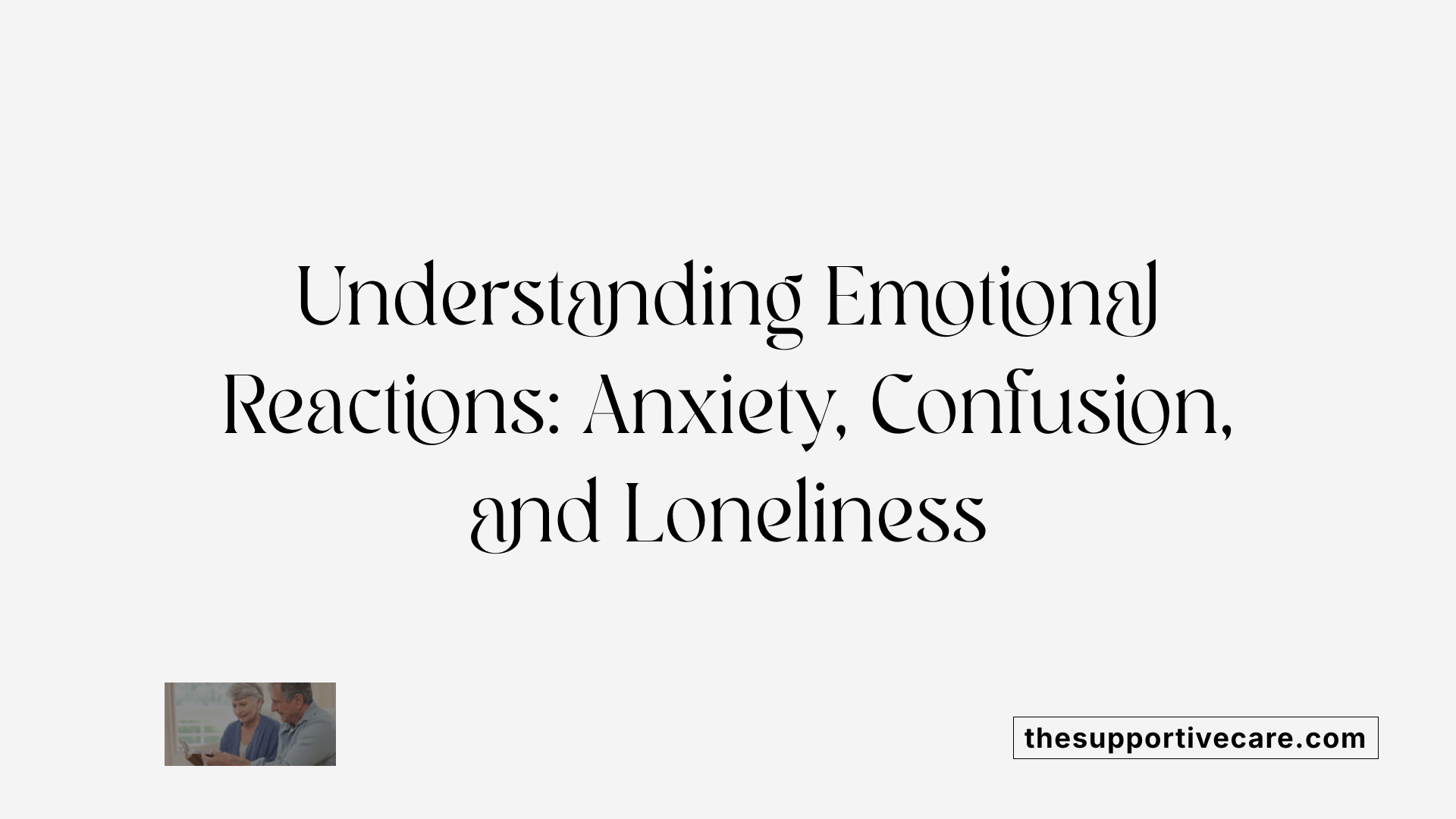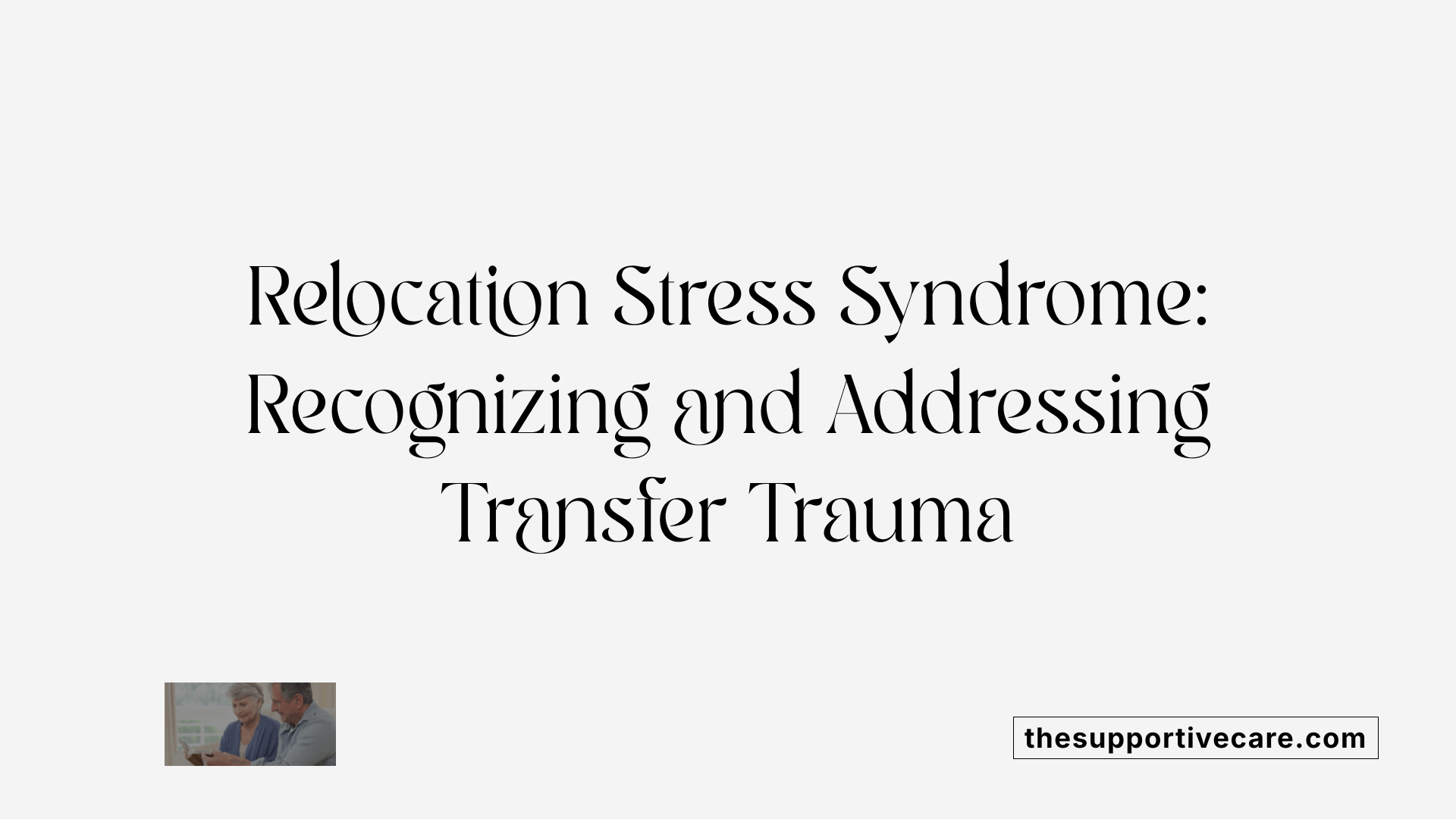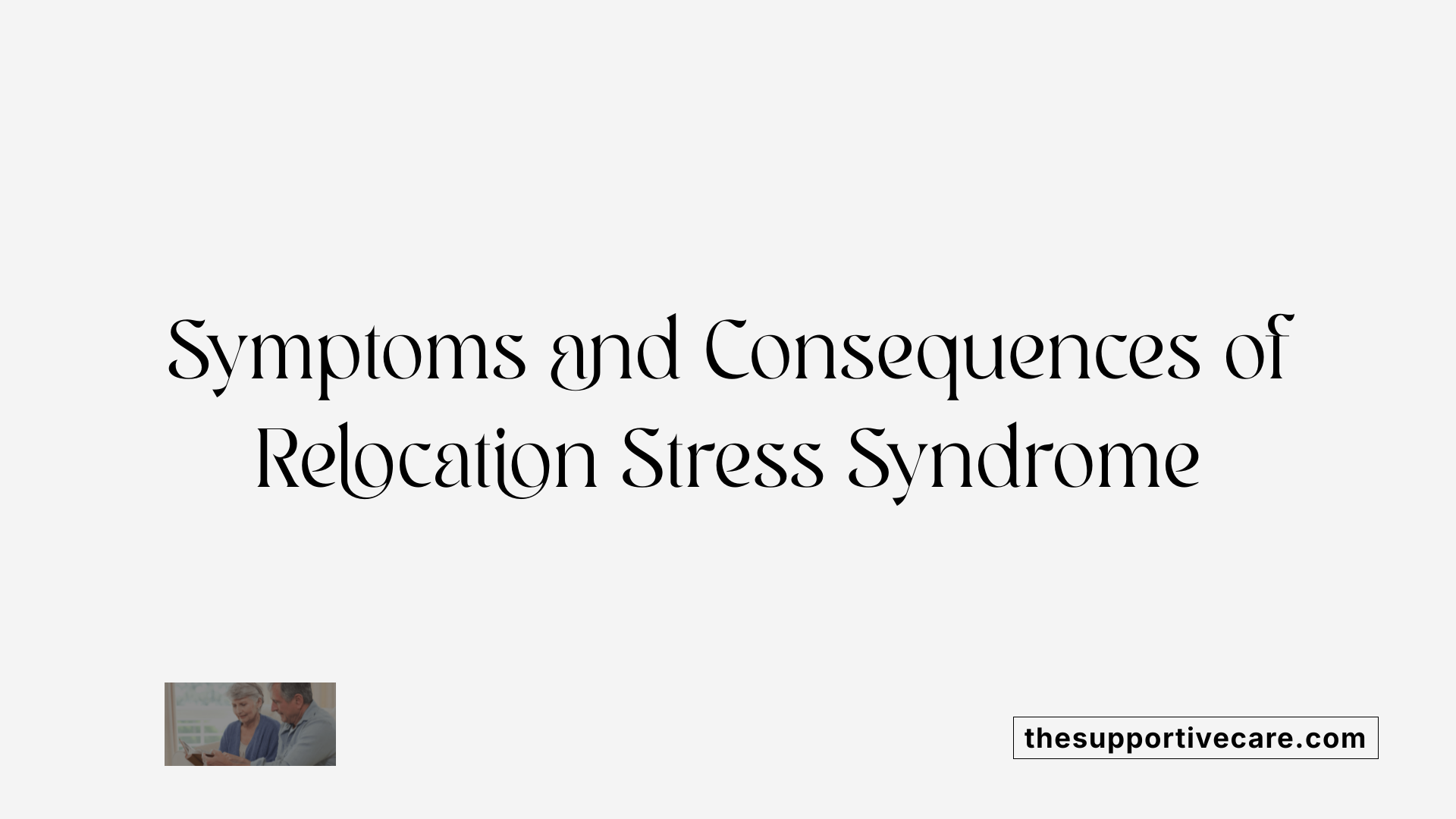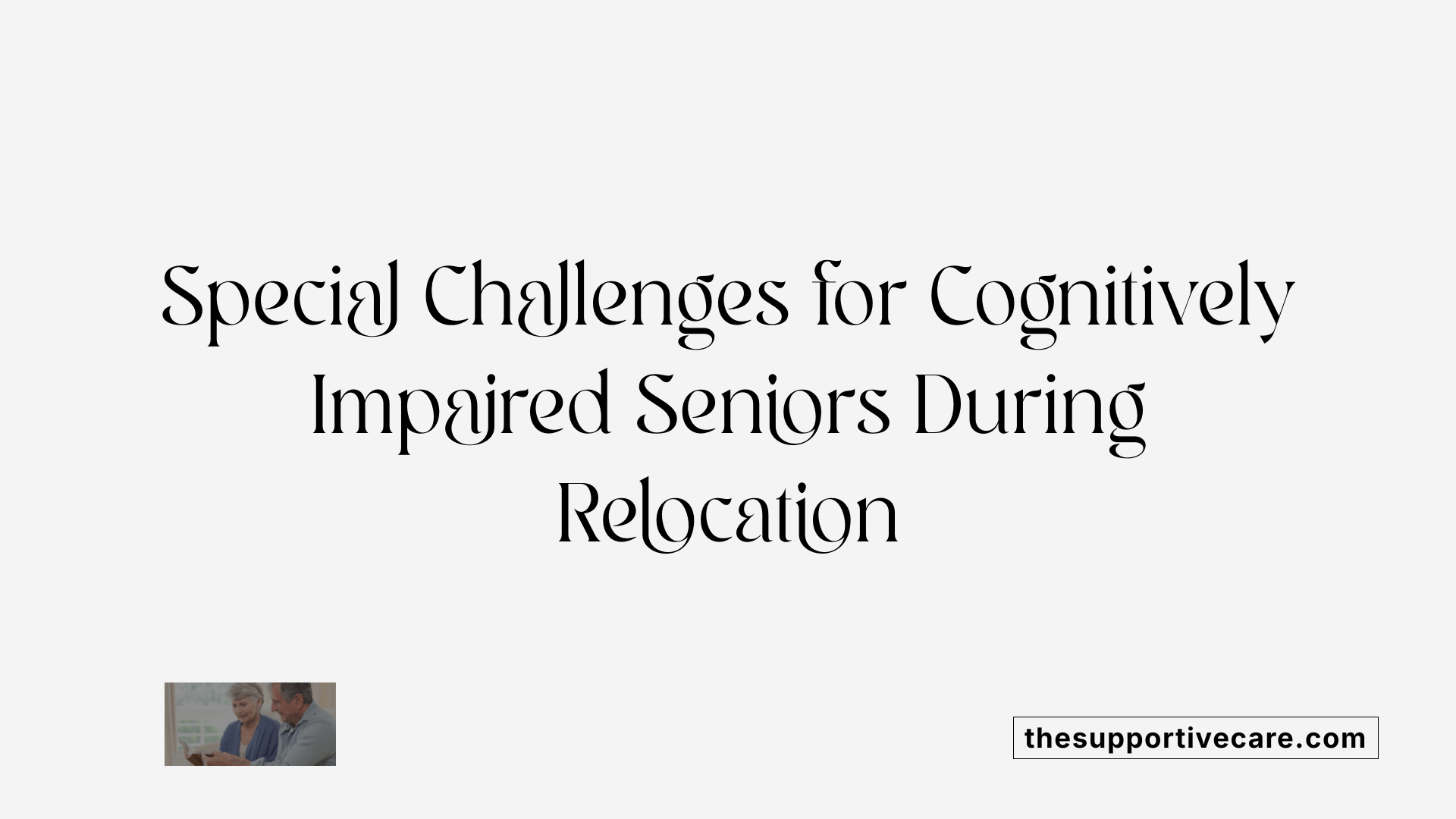Introduction: The Significance of Navigating Relocation with Care and Insight
Relocating to a new environment is a pivotal life event for elderly individuals, often accompanied by profound psychological and emotional impacts. Although sometimes necessary for safety or care needs, relocation can trigger a spectrum of reactions that threaten mental well-being, especially when poorly managed. This article examines the common psychological responses, the syndrome associated with move-related stress, influencing factors, special considerations for cognitively impaired seniors, and effective strategies to support older adults through this challenging transition.
Common Psychological Reactions in Elderly During Relocation

What psychological reactions are common among elderly individuals during relocation?
Relocation can be a highly stressful experience for older adults, often triggering a range of psychological responses. Among the most typical reactions are increased feelings of anxiety and confusion, which can stem from sudden changes in environment and routines. Elderly residents may also experience profound loneliness, especially when moving away from familiar social settings and support systems.
Depression is frequently observed during these transitions, with symptoms such as mood changes, tearfulness, and withdrawal from social activities. Sleep disturbances, including difficulty falling asleep or maintaining restful sleep, are common and can further exacerbate feelings of distress.
These reactions are especially common in involuntary moves or transitions requiring significant adjustments, such as moving into a long-term care facility. Such moves often threaten residents' sense of control and predictability, intensifying emotional distress. Factors like social isolation, inadequate preparation, and perceptions of a poor environment can heighten psychological strain.
Interestingly, cognitive impairment does not necessarily influence the level of stress experienced; both cognitively impaired and unimpaired individuals can show similar distress responses. Additionally, social losses, including bereavement, contribute to a heightened risk of depression and suicidal thoughts. Without sufficient social support, these emotional reactions can deepen, impacting overall well-being.
Understanding these common reactions allows caregivers and health professionals to better anticipate and address the mental health needs of elderly residents during and after their move. Tailored support and empathetic communication are vital to easing the emotional burden of relocation.
Understanding Relocation Stress Syndrome and Its Effects on Seniors

What is relocation stress syndrome and how does it affect elderly individuals?
Relocation Stress Syndrome (RSS), also called transfer trauma, is a collection of physical and psychological symptoms that often occur when older adults move from their familiar homes to a new environment like a nursing home or assisted-living facility. This transition can be highly stressful, especially for seniors who value their independence and emotional attachment to their home.
The symptoms of RSS include feelings of anxiety, confusion, loneliness, and depression. Residents may also experience sleep disturbances, irritability, and changes in appetite. Physical complaints such as headaches, body aches, gastrointestinal distress, and weight loss are common signs of this syndrome. These symptoms often appear within the first month of relocation and can significantly impact an elder's overall health.
For many seniors, RSS leads to further health deterioration, including increased risk of falls, infections, and cardiovascular issues. In some cases, the syndrome can contribute to premature mortality if left untreated. Recognizing RSS early and implementing personalized support strategies—such as involving family in care, maintaining routines, and fostering social connections—are essential to reducing its impact.
Support from staff, therapists, and family members plays a vital role in helping seniors adjust to their new environment. Management includes emotional reassurance, adjusting routines to meet individual needs, and addressing misconceptions about the move. With proper care, most seniors experience a decrease in symptoms over time, and their overall well-being can be maintained or improved.
Symptoms, Impacts, and Consequences of RSS

What are the symptoms and impacts of relocation stress syndrome?
Relocation Stress Syndrome (RSS) presents a broad spectrum of symptoms affecting both mental and physical health. Psychologically, individuals may experience heightened anxiety, confusion, depression, agitation, loneliness, withdrawal from social activities, mood swings, and irritability. These symptoms often emerge within the first month after moving to a new environment, especially in older adults or those with cognitive impairments.
Physically, RSS can cause sleep disturbances, headaches, gastrointestinal issues such as nausea and indigestion, body aches, and notable weight changes. The syndrome also increases the risk of falls due to confusion and impaired mobility, further compromising safety.
The impacts of RSS extend beyond immediate discomfort. It can lead to a decline in overall well-being, exacerbating pre-existing health conditions and accelerating cognitive decline. In severe cases, unaddressed symptoms contribute to increased morbidity and the risk of premature death. Psychological distress may result in dissatisfaction with the move, resistance to adapting, social withdrawal, and a decline in quality of life.
Recognizing these symptoms early is crucial for implementing effective support strategies. Without timely intervention, RSS can prolong distress, hinder adjustment to the new environment, and precipitate serious health complications. Supportive care, involving personalized approaches and psychosocial interventions, plays a vital role in mitigating these effects and promoting healthier adaptation.
Factors Influencing Psychological Outcomes during Relocation

What factors influence the psychological outcomes of elderly individuals during relocation?
Elderly individuals’ mental health during relocation is shaped by a combination of personal and environmental factors. Interestingly, studies show that cognitive status, whether impaired or unimpaired, does not significantly change how relocation stress affects mental well-being. Instead, other elements play more vital roles.
One of the most crucial factors is the level of control and autonomy residents experience during the move. Moves that are voluntary and involve active participation tend to result in better adjustment and less psychological distress. Conversely, involuntary relocations or moves involving drastic change, such as transferring from a private home to a long-term care facility, can threaten feelings of safety and predictability, leading to increased stress, depression, and anxiety.
Social support also significantly influences outcomes. Maintaining strong relationships with family, friends, and staff, and feeling connected within new social environments, help reduce feelings of loneliness and insecurity. Personalized care plans and efforts to preserve familiar routines contribute to smoother transitions and better emotional health.
Preparation and clear communication prior to relocation are essential. When residents are involved in decision-making processes, understand what to expect, and are supported throughout the move, the incidence of relocation distress can be minimized. This includes providing accurate information about the new environment and involving residents in community activities early on.
Support services such as pastoral care and counseling can also play a vital role. They address emotional, social, and spiritual needs, helping residents cope with loss, grief, and adjustment challenges.
Ultimately, recognizing and addressing these factors early on can help improve mental health outcomes for elderly individuals navigating the complex process of relocation, fostering resilience and a sense of well-being amid significant life changes.
Relocation's Effect on Elderly with Cognitive Impairments

How does relocating affect elderly individuals, particularly those with cognitive impairments like dementia?
Moving to a new environment can be particularly challenging for elderly residents, especially those with cognitive impairments such as dementia. Such relocations often lead to negative outcomes across various aspects of health and well-being.
Physically, relocation can result in increased morbidity and a higher risk of falls, pain, sleep disturbances, and a decline in overall physical health. The stress associated with moving can weaken immune responses and complicate existing health issues.
Mentally, residents with dementia or cognitive deficits often experience heightened confusion, anxiety, and depression following a move. Psychological distress may manifest as agitation, withdrawal, or behaviors like resistance to care. This emotional upheaval can exacerbate cognitive decline and diminish quality of life.
Behavioral issues, including irritability, combativeness, or refusal to participate in activities, are common after relocation. The loss of familiar surroundings and routines can make residents feel insecure, leading to increased behavioral disturbances.
Support strategies are essential to mitigate these adverse effects. Proper planning involves involving residents in decision-making, maintaining familiar routines, and ensuring personalized care. Providing social engagement opportunities, physical activity, and emotional support can foster adjustment. Using familiar objects and spaces, along with clear communication, helps residents feel safer and more in control.
Research indicates that although relocation can be distressing, these negative effects can be lessened with thoughtful preparation and ongoing support. Avoiding multiple moves, ensuring consistent care teams, and fostering a sense of community significantly improve outcomes.
In summary, while relocation can severely impact physically and cognitively vulnerable elderly individuals, targeted interventions and considerate planning play vital roles in managing these challenges, reducing distress, and promoting better health and well-being.
Supporting Data:
| Aspect | Effect of Relocation | Support Strategies | Additional Notes |
|---|---|---|---|
| Physical health | Increased falls, pain, health decline | Personalized care, mobility aids, physical activity | Regular health assessments crucial |
| Mental health | Anxiety, depression, confusion | Emotional support, routine maintenance, social activities | Involvement in decision-making |
| Behavioral issues | Resistance, agitation, withdrawal | Engage residents in familiar routines, communication | Staff training on behavioral management |
| Support strategies | Social engagement, familiar objects, supportive staff | Family involvement, clear communication, community activities | Early intervention improves adaptation |
Understanding the specific vulnerabilities of elderly residents with cognitive impairments enables caregivers and health professionals to tailor interventions and reduce the risk of severe health deterioration following relocation. Proper management is vital in safeguarding their physical health and maintaining mental stability.
Strategies to Support Elderly During Relocation
What are some strategies to support elderly individuals during relocation to reduce psychological distress?
Relocating to a new living environment can be a stressful experience for seniors, often leading to feelings of anxiety, confusion, and depression. To help minimize these negative effects, several supportive approaches can be implemented.
First, involving seniors in decisions about their move is fundamental. Giving them a voice and respecting their preferences fosters a sense of control and reduces feelings of helplessness. Engaging seniors in discussions about their new environment builds trust and helps tailor the transition to their individual needs.
Maintaining familiar routines and personal belongings also plays a critical role. Having familiar routines can provide stability during change, while cherished belongings serve as tangible links to their past and personal identity. Visiting potential new residences beforehand enables seniors to become familiar with the new surroundings, easing anticipatory anxiety.
Support services, such as consultations with social workers, care managers, and mental health professionals, support proper planning and address specific concerns. These experts can provide guidance tailored to the individual's health status, cognitive needs, and emotional wellbeing.
Providing accurate, clear information about what to expect during and after the move reduces uncertainty, giving seniors a sense of preparedness and control. Additionally, fostering opportunities for social engagement and participation in community activities can combat isolation and promote positive adjustment.
Moreover, early downsizing with family or peer support can help seniors cope with moving logistics and emotional changes. Monitoring mental health closely in the weeks following relocation ensures timely intervention if signs of distress emerge.
By combining these approaches, caregivers and family members can help seniors adjust more smoothly to their new environment, preserving their dignity, independence, and overall wellbeing.
Conclusion: Ensuring Mental Well-being in Elderly Relocation
Moving elderly individuals to new living environments is a complex process that requires careful, compassionate planning. Such transitions can trigger significant emotional distress, including anxiety, depression, and feelings of loss, often referred to as relocation stress syndrome. Recognizing the emotional and physical vulnerabilities of seniors is essential to minimize negative outcomes.
Social support plays a crucial role in easing the transition. Engaging family, friends, and care staff in providing reassurance and community participation can significantly improve residents’ adaptation. Ensuring residents feel connected and involved helps reduce feelings of loneliness and promotes a sense of security.
In addition, interventions tailored to individual needs are vital. Personalizing spaces, involving residents in decision-making, and respecting their preferences and routines can foster a feeling of control and independence. Better preparation, clear communication, and effective discharge planning further mitigate transfer trauma.
By prioritizing compassionate, person-centered approaches, caregivers can enhance the well-being of elderly residents amid their transition to new environments, ultimately supporting mental health and quality of life during this challenging time.
Summing Up: Supporting Elderly to Thrive Post-Relocation
Ensuring the mental health and emotional well-being of elderly individuals during and after relocation requires comprehensive, compassionate planning. Recognizing that relocation stress syndrome can have serious physical and psychological consequences, healthcare providers and families should prioritize personalized care approaches that involve the elderly actively. Effective communication, social support, and the involvement of multidisciplinary teams, including pastoral care, can make a significant difference. As the evidence highlights, addressing emotional needs, preserving autonomy, and fostering social connections help turn a potentially traumatic experience into an opportunity for a positive transition, ultimately improving longevity and life satisfaction for seniors.
References
- The impact of relocation stress on cognitively impaired and ...
- Effects of relocation on the elderly - PubMed
- Relocation Stress Syndrome: The Dangerous Costs of Uprooting the ...
- Nursing Home Residents, Transfer Trauma or Relocation Stress ...
- Strategies to support older adults' mental health during the transition ...
- Relocation Stress Syndrome: How to Prevent Trauma in Seniors
- Older Adults During Relocation: Key Issues They Face
- Relocation Stress Syndrome - SDSU Extension
- Relocation at older age: results from the Cognitive Function and ...
- Relocation experiences of the elderly to a long-term care facility in ...



































































































